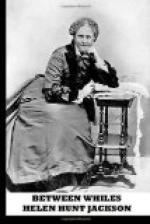“Never I am caught this way anoder year,” thought he, as he gazed wearily up and down the dark, silent road; “but that does to me no goot this time that is now.”
Gustavus Weitbreck had lived so long on his Pennsylvania farm that he even thought in English instead of in German, and, strangely enough, in English much less broken and idiomatic than that which he spoke. But his phraseology was the only thing about him that had changed. In modes of feeling, habits of life, he was the same he had been forty years ago, when he farmed a little plot of land, half wheat, half vineyard, in the Mayence meadows in the fatherland,—slow, methodical, saving, stupid, upright, obstinate. All these traits “Old Weitbreck,” as he was called all through the country, possessed to a degree much out of the ordinary; and it was a combination of two of them—the obstinacy and the savingness—which had brought him into his present predicament.
In June he had had a good laborer,—one of the best known, and eagerly sought by every farmer in the county; a man who had never yet been beaten in a mowing-match or a reaping. By his help the haying had been done in not much more than two thirds the usual time; but when John Weitbreck, like a sensible fellow, said, “Now, we would better keep Alf on till harvest; there is plenty of odds-and-ends work about the farm he can help at, and we won’t get his like again in a hurry,” his father had cried out,—
“Mein Gott! It is that you tink I must be made out of money! I vill not keep dis man on so big wages to do vat you call odd-and-end vork. We do odd-and-end vork ourself.”
There was no discussion of the point. John Weitbreck knew better than ever to waste his time and breath or temper in trying to change a purpose of his father’s or convince him of a mistake. But he bided his time; and he would not have been human if he had not now taken secret satisfaction, seeing his father’s anxiety daily increase as the August sun grew hotter and hotter, and the grain rattled in the husks waiting to be reaped, while they two, straining their arms to the utmost, and in long days’ work, seemed to produce small impression on the great fields.
“The women shall come work in field to-morrow,” thought the old man, as he continued his anxious reverie. “It is not that they sit idle all day in house, when the wheat grows to rattle like the peas in pod. They can help, the muetter and Carlen; that will be much help; they can do.” And hearing John’s steps behind him, the old man turned and said,—
“Johan, dere comes yet no man to reap. To-morrow must go in the field Carlen and the muetter; it must. The wheat get fast too dry; it is more as two men can do.”
John bit his lips. He was aghast. Never had he seen his mother and sister at work in the fields. John had been born in America; and he was American, not German, in his feeling about this. Without due consideration he answered,—




